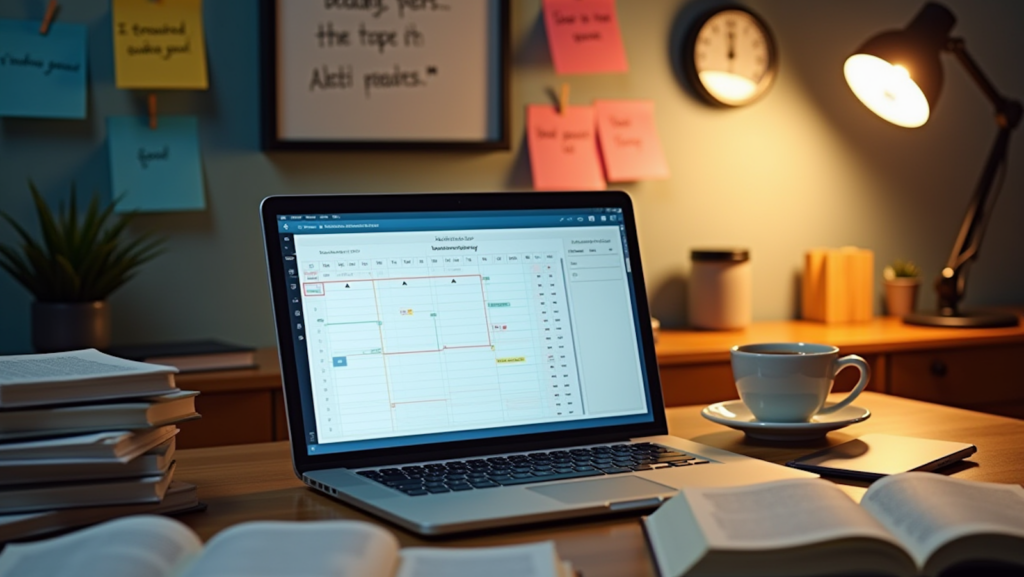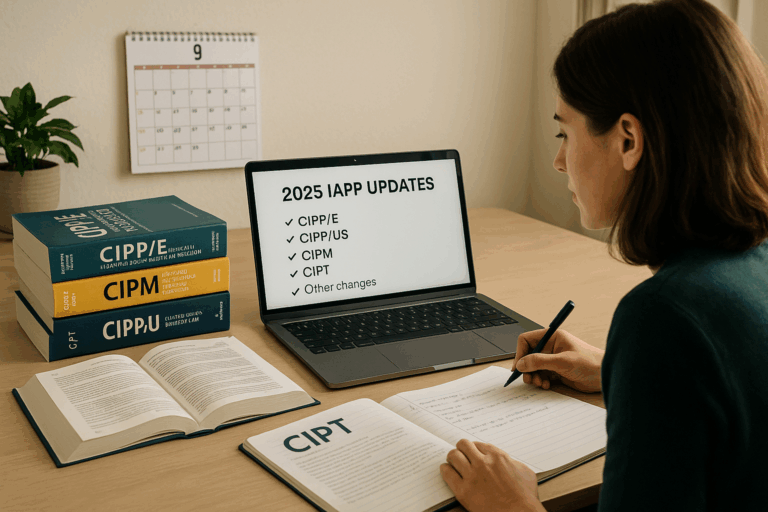Study Tips: Effective Study Time Management
Earning an IAPP certification like the CIPP/E, CIPM, or AIGP marks a major achievement in your privacy career, setting you apart as a knowledgeable privacy professional. But getting there requires more than just dedication – it demands effective study time management. Balancing study sessions with work and personal commitments can be challenging, and without a plan, it’s easy to feel overwhelmed. This guide outlines essential strategies to help you manage your study time effectively, empowering you to prepare for the exam while maintaining a balanced life. By using proven methods, you can reduce stress, boost focus, and build the confidence you need to succeed.

The Importance of Study Time Management for Exam Success
Good study time management is crucial for exam success. When you manage your time well, you can cover all necessary topics without feeling burnt out or rushed. Effective time allocation also prevents last-minute cramming, which often leads to increased stress and poor information retention. Instead, a steady, structured approach lets you absorb information over time, enhancing your understanding and memory of key concepts.
Proper time management brings several benefits:
- Improved Focus – Setting dedicated times for study allows you to give your full attention to the material without distraction.
- Balanced Schedule – With set study times, you create space for rest and personal life, which helps prevent burnout.
- Confidence Boosting – A clear, well-paced plan builds your confidence as the exam date approaches, reducing anxiety.
By understanding the value of time management, you’re already taking the first step toward efficient and stress-free study sessions.
Finding the Right Time to Schedule Your Exam
One of the first steps in managing your study time is to decide when to schedule your exam. This decision involves balancing early planning with a realistic view of your progress. Booking an exam date early can be motivating, as it provides a target date to work toward. However, an early date can also add pressure if you’re unsure how much study time you’ll need.
Instead, find a balance based on your readiness:
- Motivation vs. Pressure – An early date can help you stay focused, but may feel overwhelming if you’re not yet familiar with the study material.
- Accurate Time Estimation – Waiting until you’re further along in your studies can help you better judge how much time is required for thorough preparation.
By choosing an exam date that aligns with your progress and goals, you create a realistic timeline that reduces stress and enhances study effectiveness.
Building an Effective Study Schedule
Once you’ve chosen a realistic exam date, it’s time to create a structured study schedule. Effective study time management starts with setting clear goals for each study session. By defining what you want to accomplish every time you sit down to study, you can stay focused and avoid feeling overwhelmed by the sheer amount of material.
Here are some practical steps to build an effective study schedule:
- Set Clear Objectives – Begin each session with a specific goal, such as completing a chapter or mastering a set of concepts. This focus helps keep each study period productive.
- Use Focused Time Blocks – Try techniques like the Pomodoro Technique, which involves 25 minutes of study followed by a short 5-minute break. These blocks encourage intense focus and reduce the chances of burnout.
- Prioritise Difficult Topics – Schedule complex or challenging topics when your energy levels are highest, usually earlier in the day. This will help you tackle demanding material when you’re most alert.
- Minimise Distractions – A quiet, dedicated study space helps you make the most of your study time. Silence notifications and remove potential distractions from your environment to enhance focus.
Consistency is key to successful study time management. Regular, shorter study sessions are often more effective for retaining information than infrequent, lengthy ones. Aim to build a routine that aligns with your daily schedule for the best results.
When using 22Academy’s eLearning platform, it lets you set an end date and track your progress in real time, showing if you’re on, behind, or ahead of schedule. With study statistics available, you can easily identify areas that need extra review before the exam.
Taking a Final Practice Exam One Week in Advance
To gauge your readiness and fine-tune your focus, plan a full practice exam about one week before your scheduled test date. This trial run is an invaluable part of study time management, as it reveals any remaining weak spots while still giving you time to review them thoroughly. With a week left, you have the flexibility to revisit challenging topics and make the necessary adjustments to your study plan.
Why this timing is ideal:
- Final Review Opportunity – A week provides enough time for you to strengthen any areas that were challenging in the practice exam. You’ll enter exam day feeling more confident and prepared.
- Flexibility for Rescheduling – If your practice exam results are significantly lower than expected, you’ll still have the option to reschedule at least 48 hours in advance, avoiding extra fees and unnecessary stress.
Taking a final practice test at the right time sharpens your focus and ensures that any last-minute adjustments are productive and targeted. This strategy helps solidify your understanding and boosts your confidence for the actual exam.
Allocating Study Time During Less Busy Periods
A crucial aspect of study time management is knowing when to study. Not every time is equally productive, and recognising less busy periods can help you maximise focus and retention. By choosing quieter times, such as weekends or periods when work commitments are lighter, you allow yourself to dive into the material with minimal distractions and a clearer mind.
Here are some tips for allocating study time effectively:
- Leverage Weekends and Holidays – Use weekends or public holidays to schedule longer study sessions. These periods often allow for more uninterrupted time to absorb complex material.
- Adjust Workload if Possible – As your exam date approaches, consider lightening your workload or taking time off if feasible. This extra study time can make a significant difference in your preparation.
- Communicate with Stakeholders – Inform friends, family, and colleagues about your study schedule so they can support your commitment. Letting people know in advance can help minimise interruptions and distractions.
Effective study time management is about quality over quantity. Studying during times when you’re less distracted enables deeper focus and more productive sessions, helping you retain information more effectively and feel prepared as the exam approaches.
Additional Time Management Tips and Tools
While a strong study schedule and strategic practice tests are fundamental, small adjustments to your daily habits can make a big difference in maintaining focus and efficiency. Effective study time management is also about finding tools and techniques that suit your personal study style.
Consider these additional tips to enhance your study routine:
- Use a Planner or Digital Calendar – Plot your study sessions alongside work and personal commitments in a planner or calendar. This visual scheduling helps you keep track of progress and spot potential conflicts early. Many people find digital tools like Trello, Asana, or Google Calendar ideal for organising tasks and setting reminders.
- Break Down Large Topics – Dividing larger subjects into smaller, manageable sections can help prevent information overload. By setting mini-deadlines for each section, you’ll keep up momentum and make steady progress.
- Limit Procrastination – Identify specific triggers for procrastination and develop strategies to counteract them. For example, start each study session with the most challenging topic when your mind is fresh, or pair up with an accountability partner to stay on track.
Finally, pay attention to your well-being. Staying sharp and focused requires a balanced approach to health. Get plenty of sleep, incorporate physical activity to manage stress, and eat well to support sustained mental energy. With these tools and habits in place, you’re building a solid foundation for effective and focused study sessions.
Conclusion
Mastering study time management is a critical step toward success in your IAPP certification journey. By balancing your exam scheduling, building a structured study plan, and assessing your progress regularly, you can approach exam day with confidence. The key isn’t just about studying harder; it’s about studying smarter, optimising your time, and maintaining focus without sacrificing your personal life.
Platforms like 22Academy make this approach easier. With self-paced courses and tools specifically designed to support your study goals, 22Academy offers a variety of resources to streamline your preparation. You can use their study statistics and tracking features to monitor your progress, take a trial exam to assess readiness, or reinforce concepts with printable flashcards. The platform even offers audio articles, allowing you to study flexibly by listening while commuting or exercising.
By using these tools to structure your time and stay focused, you’ll be well-prepared for your exam and ready to apply these time management skills in your professional life.






